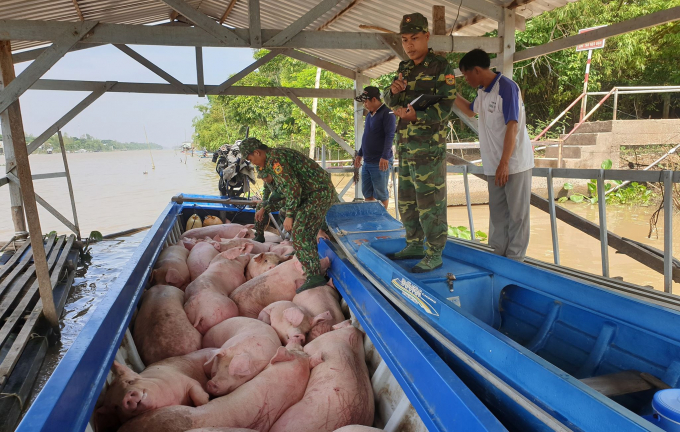November 28, 2025 | 01:04 GMT +7
November 28, 2025 | 01:04 GMT +7
Hotline: 0913.378.918
November 28, 2025 | 01:04 GMT +7
Hotline: 0913.378.918

A smuggling of pigs across Cambodia border was arrested by the border guards. Photo: L.T.
The Cambodian Ministry of Agriculture, Forestry and Fisheries on May 19th sent a document to the Cambodian border provinces, stating that outbreaks of African Swine Fever (ASF) has spread throughout the Asian nations.
In order to protect the country from ASF invasion, the Cambodian Ministry of Agriculture, Forestry and Fisheries asked the authorities of the Cambodian border provinces to prevent the illegal imports of live pigs, pork and pork products into the country.
It is forecasted that in the coming time, Cambodia will enhance inspection and control of unofficial import activities for live pigs, pork and pork products on the Cambodia-Vietnam border. Along with that, the Cambodian authorities will tighten quarantine for pork and pork products imported across land border gates with Vietnam.
The Ministry of Industry and Trade recommended that businesses and traders exporting live pigs, pork and pork products on the border with Cambodia should pay attention to exporting by official channels, meeting the requirements on hygiene and food safety as well as preparing all necessary permits for animal quarantine.
Cambodia' s demand for pork is about 7,000-8,000 pigs per day ( a pig weighs roughly 60kg). Meanwhile, the domestic supply can meet 6,000 pigs per day and it still needs to import over 1,000 pigs per day. To meet that demand, the Cambodian private traders have imported live pigs mainly from the neighboring countries such as Vietnam and Thailand.
The Cambodian traders mainly import live pigs and pork by unofficial channels in order to save time, reduce costs and to avoid applying for animal quarantine inspection certificates as required by the authorities in the two countries.
Translated by Mai Tham

(VAN) After the institutional merger, Da Nang possesses significant forest-carbon reserves and is proactively engaging in the carbon market, creating a new revenue stream.

(VAN) An Giang strengthens communication against IUU fishing, increases inspections and sanctions, and is determined to remove the EC’s “yellow card” while developing a sustainable fisheries sector.

(VAN) As green transition becomes a global trajectory, Viet Nam’s biggest challenge is not only technology and models, but how to ensure that capital flows reach the right beneficiaries.

(VAN) The Ministry of Agriculture and Environment must spearhead the construction of green governance, spanning decision-making processes and investment standards to policy evaluation mechanisms.

(VAN) The Agriculture and Environment sector of Khanh Hoa has achieved numerous milestones over the past 80 years, contributing significantly to the goal of establishing the province as a centrally governed city by 2030.

(VAN) Viet Nam is entering the pivotal period of 2025-2030, moving toward the formulation of the Remote Sensing Law, which will establish a legal foundation for the development of national digital data.

(VAN) The agricultural sector is finalizing the strategic framework for emission reduction, setting the goal of sharply cutting methane and 403.7 million tons of CO2 equivalent and moving toward Net Zero by 2050.